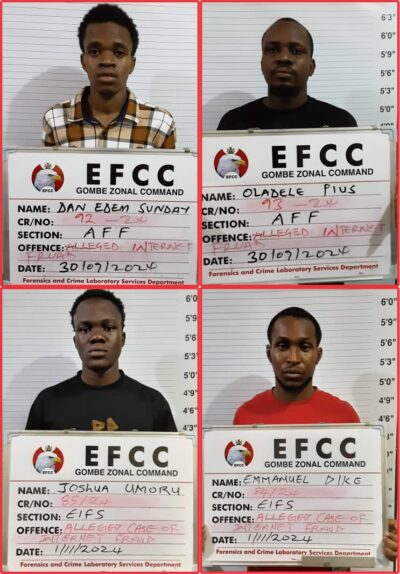The Economic and Financial Crimes Commission (EFCC) has successfully secured convictions for twelve internet fraudsters in Adamawa State. The convicts, who were found guilty of cheating and impersonation, were sentenced to various jail terms by the Adamawa State High Court. Justices Kayanson Samuel Lawanson, Hammed Isha, Benjamin Manji Lawal, and Mohammed Ibrahim Tola presided over the case, which saw individuals involved in a range of cybercrimes, including online fraud and identity theft.
The convicted individuals include Oladele Pius, Emmanuel Bulus, Elijah Elisha, Alamin Mohammed Bappa, Jamilu Usman, Enoch Solomon, Emmanuel Anthony, Enebeli Samuel Israel, Dimas Hyellabulatin, Emmanuel Dike, Joshua Umoru, and Dan Eden Sunday. The defendants were arraigned separately between November 6 and 7, 2024, on charges relating to cybercrimes, including creating fake online identities to defraud unsuspecting foreign nationals.
The Nature of the Crimes Committed narrated by EFCC
The charges against the convicts varied by EFCC, but all stemmed from fraudulent activities carried out via social media and messaging platforms. For example, Alamin Mohammed Bappa was accused of creating fake Gmail and Facebook accounts under the alias “Jacob Sermon” to pose as a cybersecurity professional. Bappa defrauded individuals by offering account recovery services for a $20 fee, targeting unsuspecting foreign nationals. His actions were classified as cheating by impersonation, violating the Penal Code Law of Adamawa State.
Similarly, Oladele Pius, a student at Modibo Adamawa University of Technology Yola, was convicted for using a false identity—”Mr. Legit Hassan Abbadin”—to defraud internet users. Pius operated this scam through a WhatsApp account and used an iPhone 11 to facilitate virtual transactions, seeking financial gain from unsuspecting individuals. These deceptive activities were also categorized under the same charge of cheating by impersonation by EFCC under Section 314 of the Penal Code Law.
Court Sentencing and Penalties
Following the guilty pleas of the defendants, the prosecution, represented by counsels Saad H. Sa’ad and M.D Aliyu, urged the court to impose appropriate sentences. The judges delivered their verdicts, handing down a variety of sentences depending on the severity of each convict’s actions. For example, Emmanuel Bulus, Elijah Elisha, Jamilu Usman, and Enebeli Samuel Israel were sentenced to ten years in prison or a fine of N200,000 each.
Other convicts, including Dimas Hyellabulati, received a five-year prison sentence or a fine of N200,000, while Emmanuel Dike, Joshua Umoru, Dan Eden Sunday, and Oladele Pius were sentenced to five years in prison with an option to pay a fine of N2 million each. Alamin Mohammed Bappa and Enoch Solomon also faced five years imprisonment or a fine of N200,000 each. Emmanuel Anthony was sentenced to ten years imprisonment or a fine of N300,000.
Additional Orders and Forfeitures
The court also issued additional orders regarding the seizure of assets related to the crimes. All mobile phones recovered during the investigation were ordered to be forfeited to the Federal Government of Nigeria. In a notable development, Justice Lawal ordered that $20, which was recovered from Bappa and was identified as proceeds of crime, be returned to the victim.
The twelve convicts were arrested on September 24, 2024, by EFCC operatives, following actionable intelligence linking them to cybercrime activities. They were apprehended near Modibo Adamawa University of Technology in Yola, Adamawa State, and subsequently charged in court by EFCC. Their convictions mark a significant victory for the EFCC in its ongoing efforts to combat internet fraud and cybercrime across Nigeria.The EFCC giant stride in combating cymber crime in Nigeria is a good omen for Nigeria institutions are capable of building Nigeria state
Table of Contents
Discover more from OGM News NG
Subscribe to get the latest posts sent to your email.














